Ward A.W. The Cambridge History of British Foreign Policy. 1783-1919. Volume 3
Подождите немного. Документ загружается.

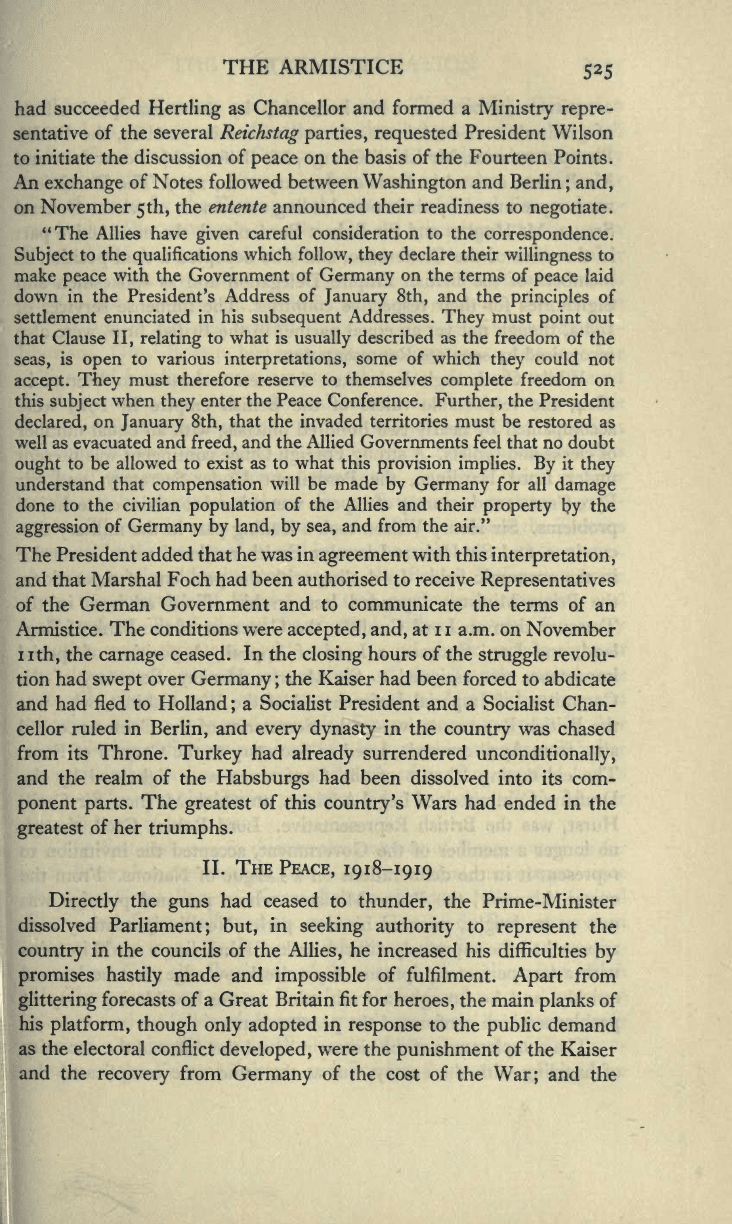
THE
ARMISTICE
525
had
succeeded
Hertling
as Chancellor
and formed
a
Ministry
repre-
sentative
of
the
several
Reichstag parties,
requested
President
Wilson
to
initiate
the discussion of
peace
on
the
basis
of
the Fourteen Points.
An
exchange
of
Notes
followed
between
Washington
and
Berlin;
and,
on
November
5th,
the
entente announced their
readiness
to
negotiate.
"The Allies have
given
careful consideration to the
correspondence.
Subject
to the
qualifications
which
follow,
they
declare their
willingness
to
make
peace
with
the
Government
of
Germany
on
the
terms of
peace
laid
down
in the
President's
Address
of
January
8th,
and
the
principles
of
settlement
enunciated in
his
subsequent
Addresses.
They
must
point
out
that Clause
II,
relating
to what is
usually
described as
the
freedom of
the
seas,
is
open
to various
interpretations,
some
of
which
they
could not
accept. They
must
therefore
reserve
to themselves
complete
freedom
on
this
subject
when
they
enter the Peace Conference.
Further,
the
President
declared,
on
January
8th,
that the invaded territories must
be
restored as
well
as evacuated
and
freed,
and
the Allied Governments feel
that no
doubt
ought
to be allowed
to exist as to what this
provision
implies.
By
it
they
understand
that
compensation
will
be
made
by
Germany
for
all
damage
done
to the civilian
population
of the Allies and their
property
by
the
aggression
of
Germany by
land,
by
sea,
and
from the
air."
The President
added
that
he was in
agreement
with this
interpretation,
and that
Marshal
Foch
had
been authorised
to
receive
Representatives
of
the
German Government
and
to communicate the terms of
an
Armistice.
The conditions
were
accepted,
and,
at
11
a.m. on
November
nth,
the
carnage
ceased.
In
the
closing
hours of
the
struggle
revolu-
tion
had
swept
over
Germany
;
the
Kaiser
had
been forced
to
abdicate
and
had fled to
Holland
;
a Socialist President
and
a
Socialist Chan-
cellor
ruled
in
Berlin,
and
every
dynasty
in
the
country
was chased
from
its
Throne.
Turkey
had
already
surrendered
unconditionally,
and
the
realm
of
the
Habsburgs
had been
dissolved
into
its
com-
ponent
parts.
The
greatest
of this
country's
Wars
had ended
in
the
greatest
of
her
triumphs.
II.
The
Peace,
1918-1919
Directly
the
guns
had ceased
to
thunder,
the
Prime-Minister
dissolved
Parliament; but,
in
seeking
authority
to
represent
the
country
in
the
councils of the
Allies,
he
increased his
difficulties
by
promises
hastily
made
and
impossible
of
fulfilment.
Apart
from
glittering
forecasts
of
a
Great
Britain fit
for
heroes,
the
main
planks
of
his
platform,
though
only
adopted
in
response
to the
public
demand
as
the
electoral
conflict
developed,
were the
punishment
of
the Kaiser
and
the
recovery
from
Germany
of
the
cost
of
the
War;
and
the
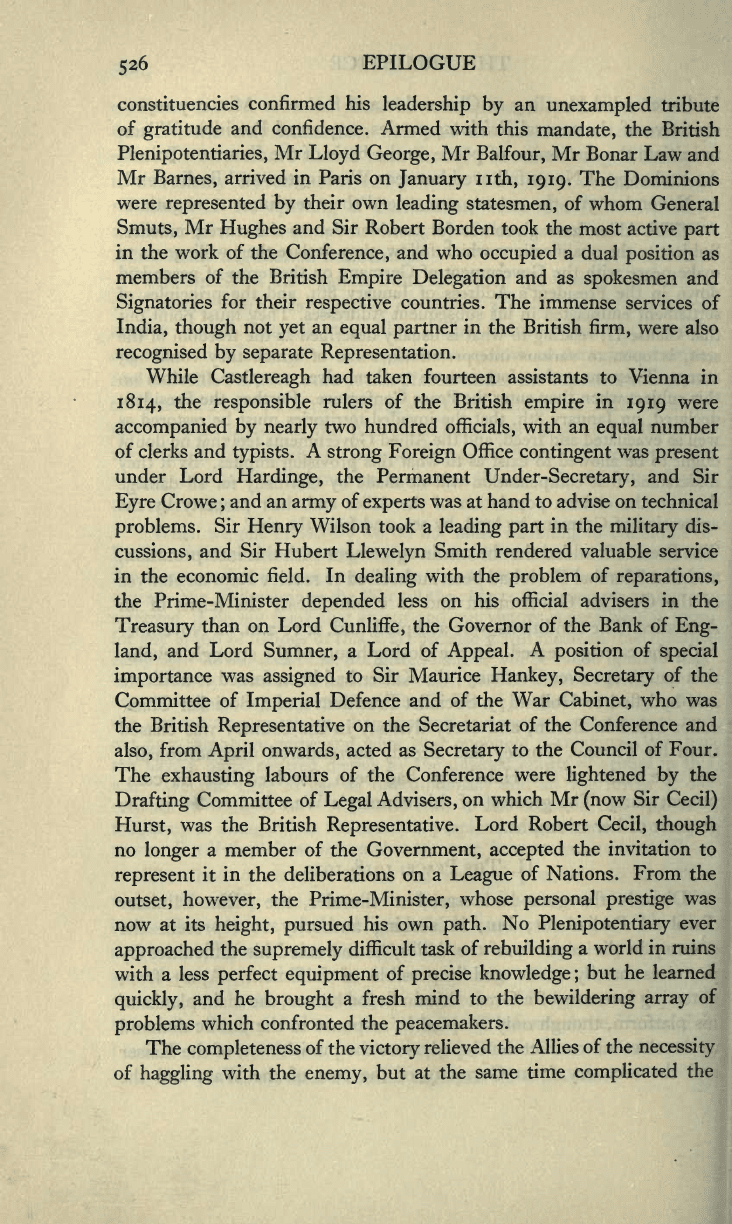
526
EPILOGUE
constituencies
confirmed his
leadership
by
an
unexampled
tribute
of
gratitude
and
confidence.
Armed
with this
mandate,
the
British
Plenipotentiaries,
Mr
Lloyd
George,
Mr
Balfour,
Mr
Bonar Law
and
Mr
Barnes,
arrived in
Paris on
January
nth,
1919.
The Dominions
were
represented
by
their
own
leading
statesmen,
of whom
General
Smuts,
Mr
Hughes
and Sir
Robert Borden took
the
most active
part
in the work of
the
Conference,
and who
occupied
a
dual
position
as
members
of
the British
Empire
Delegation
and as
spokesmen
and
Signatories
for
their
respective
countries. The
immense
services
of
India,
though
not
yet
an
equal
partner
in
the British
firm,
were also
recognised
by
separate
Representation.
While
Castlereagh
had
taken fourteen assistants
to
Vienna
in
1
8
14,
the
responsible
rulers
of
the
British
empire
in
19 19
were
accompanied
by nearly
two hundred
officials,
with
an
equal
number
of
clerks
and
typists.
A
strong Foreign
Office
contingent
was
present
under Lord
Hardinge,
the Permanent
Under-Secretary,
and
Sir
Eyre
Crowe
;
and an
army
of
experts
was
at hand to
advise on
technical
problems.
Sir
Henry
Wilson
took
a
leading
part
in
the
military
dis-
cussions,
and Sir
Hubert
Llewelyn
Smith rendered valuable service
in
the
economic
field.
In
dealing
with the
problem
of
reparations,
the
Prime-Minister
depended
less
on
his official
advisers
in
the
Treasury
than
on
Lord
Cunliffe,
the Governor
of the
Bank
of
Eng-
land,
and
Lord
Sumner,
a
Lord of
Appeal.
A
position
of
special
importance
was
assigned
to
Sir
Maurice
Hankey, Secretary
of
the
Committee
of
Imperial
Defence
and
of
the
War
Cabinet,
who was
the
British
Representative
on the Secretariat
of
the Conference
and
also,
from
April
onwards,
acted as
Secretary
to the
Council
of
Four.
The
exhausting
labours
of
the
Conference
were
lightened
by
the
Drafting
Committee
of
Legal
Advisers,
on which
Mr
(now
Sir
Cecil)
Hurst,
was
the
British
Representative.
Lord Robert
Cecil,
though
no
longer
a
member
of
the
Government,
accepted
the invitation to
represent
it
in
the deliberations
on
a
League
of
Nations.
From
the
outset,
however,
the
Prime-Minister,
whose
personal
prestige
was
now at its
height, pursued
his
own
path.
No
Plenipotentiary
ever
approached
the
supremely
difficult
task
of
rebuilding
a world
in ruins
with
a less
perfect
equipment
of
precise
knowledge
;
but
he learned
quickly,
and he
brought
a fresh
mind
to
the
bewildering
array
of
problems
which
confronted
the
peacemakers.
The
completeness
of
the
victory
relieved
the
Allies
of
the
necessity
of
haggling
with the
enemy,
but at the
same time
complicated
the
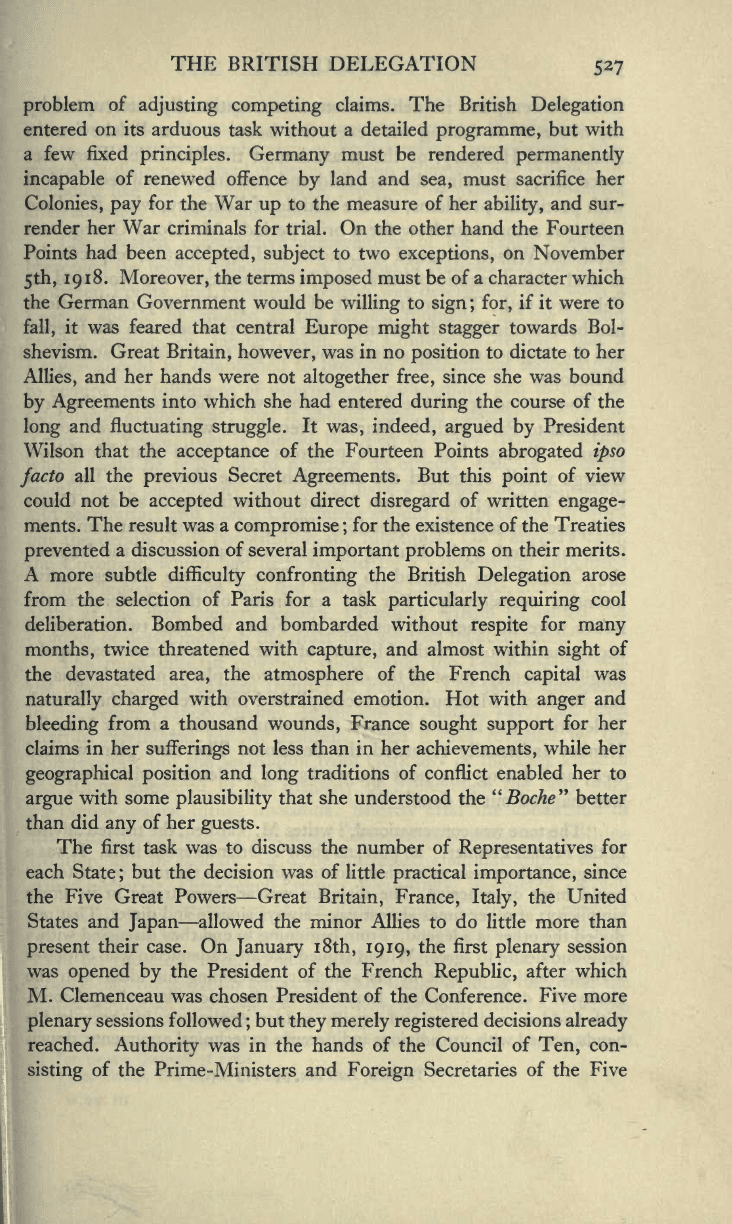
THE
BRITISH DELEGATION
527
problem
of
adjusting
competing
claims. The
British
Delegation
entered
on
its arduous
task without
a
detailed
programme,
but
with
a few fixed
principles.
Germany
must be rendered
permanently
incapable
of
renewed
offence
by
land and
sea,
must
sacrifice
her
Colonies,
pay
for
the
War
up
to the measure
of her
ability,
and
sur-
render
her War
criminals for
trial. On
the other
hand
the Fourteen
Points
had
been
accepted, subject
to two
exceptions,
on November
5th,
1918.
Moreover,
the terms
imposed
must be of
a
character
which
the
German
Government
would be
willing
to
sign
;
for,
if
it
were to
fall,
it
was
feared
that central
Europe might stagger
towards
Bol-
shevism.
Great
Britain,
however,
was in no
position
to
dictate
to
her
Allies,
and her hands were
not
altogether
free,
since
she
was bound
by
Agreements
into
which she
had
entered
during
the course
of
the
long
and
fluctuating struggle.
It
was, indeed,
argued by
President
Wilson
that
the
acceptance
of
the Fourteen Points
abrogated
ipso
facto
all
the
previous
Secret
Agreements.
But this
point
of view
could not
be
accepted
without direct
disregard
of
written
engage-
ments.
The
result
was a
compromise
;
for
the existence
of
the
Treaties
prevented
a
discussion of several
important
problems
on
their
merits.
A more subtle
difficulty confronting
the British
Delegation
arose
from
the
selection of Paris
for a
task
particularly requiring
cool
deliberation.
Bombed and bombarded
without
respite
for
many
months,
twice
threatened
with
capture,
and almost within
sight
of
the
devastated
area,
the
atmosphere
of
the French
capital
was
naturally
charged
with
overstrained emotion. Hot with
anger
and
bleeding
from a
thousand
wounds,
France
sought support
for her
claims in her
sufferings
not
less
than
in her
achievements,
while her
geographical
position
and
long
traditions
of
conflict
enabled
her to
argue
with some
plausibility
that
she
understood the
"Boche"
better
than
did
any
of
her
guests.
The
first
task was to
discuss
the number of
Representatives
for
each
State
;
but the decision
was of
little
practical importance,
since
the Five Great Powers
—
Great
Britain,
France,
Italy,
the
United
States
and
Japan
—
allowed the minor Allies to do little more than
present
their
case. On
January
18th,
19
19,
the
first
plenary
session
|
r
as
opened
by
the President of the French
Republic,
after which
1.
Clemenceau was
chosen
President
of
the
Conference.
Five more
lenary
sessions
followed
;
but
they merely
registered
decisions
already
cached.
Authority
was
in
the
hands
of
the
Council
of
Ten,
con-
sting
of
the
Prime-Ministers
and
Foreign
Secretaries
of
the Five
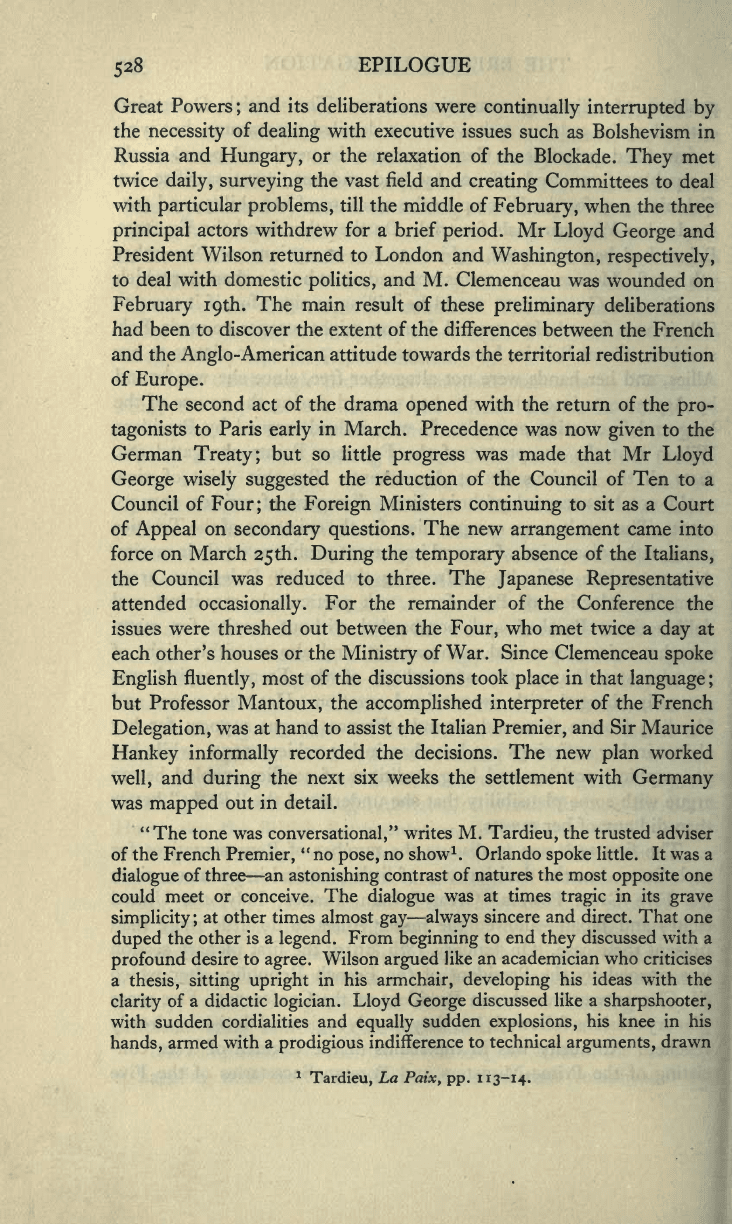
528
EPILOGUE
Great
Powers
;
and
its
deliberations were
continually
interrupted
by
the
necessity
of
dealing
with
executive
issues
such
as Bolshevism
in
Russia
and
Hungary,
or
the relaxation of
the
Blockade.
They
met
twice
daily,
surveying
the
vast field and
creating
Committees
to deal
with
particular problems,
till the
middle
of
February,
when the three
principal
actors withdrew for
a
brief
period.
Mr
Lloyd
George
and
President Wilson returned
to
London
and
Washington,
respectively,
to deal with domestic
politics,
and M.
Clemenceau was
wounded
on
February
19th.
The
main
result
of
these
preliminary
deliberations
had been to discover the
extent
of
the differences
between
the French
and the
Anglo-American
attitude towards the
territorial
redistribution
of
Europe.
The second
act
of the drama
opened
with the
return
of
the
pro-
tagonists
to
Paris
early
in
March. Precedence was now
given
to
the
German
Treaty;
but
so
little
progress
was
made
that
Mr
Lloyd
George wisely
suggested
the reduction
of
the Council
of
Ten to a
Council of
Four;
the
Foreign
Ministers
continuing
to sit as a
Court
of
Appeal
on
secondary questions.
The new
arrangement
came into
force
on
March
25th. During
the
temporary
absence
of
the
Italians,
the
Council was reduced to three.
The
Japanese Representative
attended
occasionally.
For the remainder
of
the Conference
the
issues
were threshed out between the
Four,
who
met twice a
day
at
each other's
houses or the
Ministry
of War. Since
Clemenceau
spoke
English
fluently,
most
of
the
discussions
took
place
in
that
language
;
but
Professor
Mantoux,
the
accomplished interpreter
of
the French
Delegation,
was at
hand to
assist the
Italian
Premier,
and Sir
Maurice
Hankey
informally
recorded
the
decisions. The new
plan
worked
well,
and
during
the
next
six weeks
the settlement
with
Germany
was
mapped
out
in
detail.
"The
tone was
conversational,"
writes
M.
Tardieu,
the trusted
adviser
of
the French
Premier,
M
no
pose,
no show
1
.
Orlando
spoke
little. It
was
a
dialogue
of
three
—
an
astonishing
contrast
of natures the most
opposite
one
could
meet
or
conceive.
The
dialogue
was at times
tragic
in
its
grave
simplicity;
at other
times
almost
gay
—
always
sincere
and
direct. That
one
duped
the
other is a
legend.
From
beginning
to end
they
discussed with a
profound
desire
to
agree.
Wilson
argued
like
an
academician who
criticises
a
thesis,
sitting upright
in his
armchair,
developing
his ideas with
the
clarity
of
a didactic
logician.
Lloyd George
discussed like
a
sharpshooter,
with
sudden
cordialities
and
equally
sudden
explosions,
his knee
in his
hands,
armed
with a
prodigious
indifference
to technical
arguments,
drawn
1
Tardieu,
La
Paix,
pp.
1
13-14.
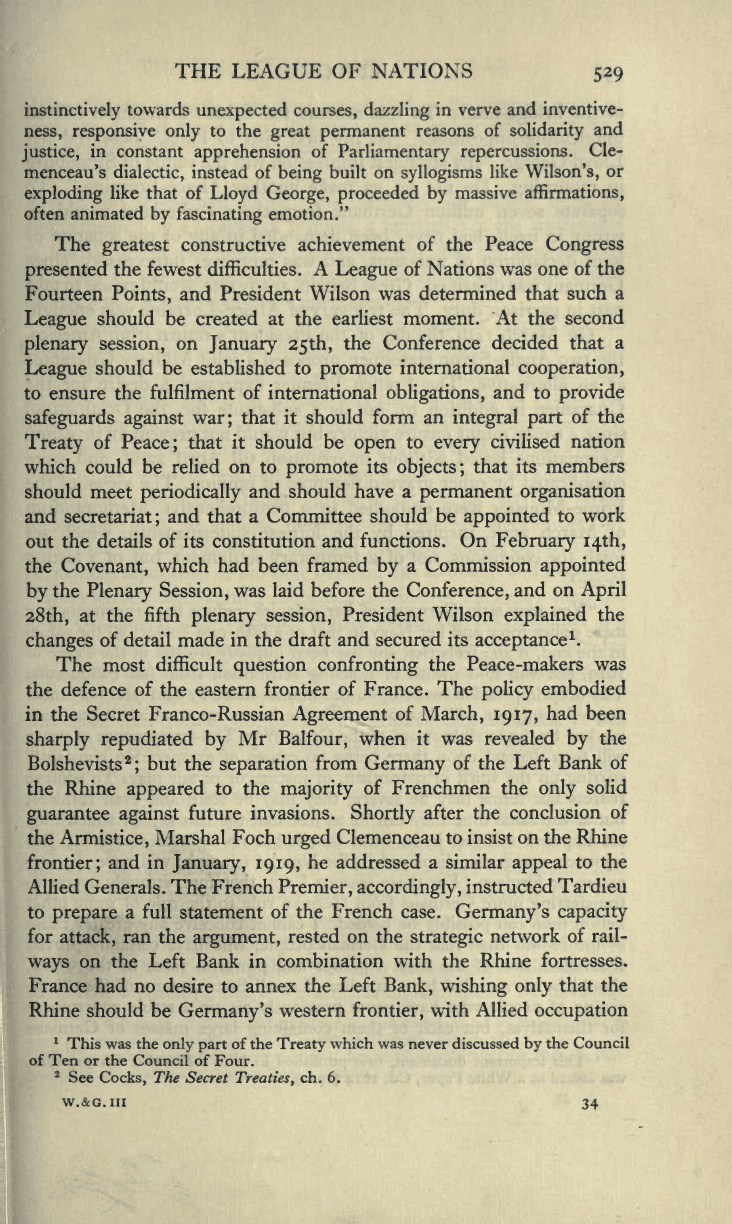
THE
LEAGUE OF
NATIONS
529
instinctively
towards
unexpected
courses,
dazzling
in
verve
and
inventive-
ness,
responsive
only
to
the
great permanent
reasons
of
solidarity
and
justice,
in
constant
apprehension
of
Parliamentary repercussions.
Cle-
menceau's
dialectic,
instead of
being
built
on
syllogisms
like
Wilson's,
or
exploding
like that
of
Lloyd George,
proceeded
by
massive
affirmations,
often animated
by
fascinating
emotion."
The
greatest
constructive
achievement
of
the Peace
Congress
presented
the
fewest
difficulties.
A
League
of
Nations
was one
of the
Fourteen
Points,
and
President
Wilson
was
determined that
such
a
League
should
be created at
the earliest moment.
At the
second
plenary
session,
on
January
25th,
the
Conference
decided
that
a
League
should be
established
to
promote
international
cooperation,
to
ensure
the fulfilment
of
international
obligations,
and
to
provide
safeguards
against
war;
that
it
should form an
integral
part
of the
Treaty
of
Peace;
that it
should be
open
to
every
civilised nation
which
could be
relied on to
promote
its
objects;
that its
members
should
meet
periodically
and should have a
permanent
organisation
and
secretariat;
and
that
a
Committee
should
be
appointed
to
work
out the
details of
its
constitution
and
functions.
On
February
14th,
the
Covenant,
which had
been
framed
by
a Commission
appointed
by
the
Plenary
Session,
was laid before the
Conference,
and
on
April
28th,
at
the fifth
plenary
session,
President
Wilson
explained
the
changes
of detail made
in the draft
and
secured its
acceptance
1
.
The most difficult
question
confronting
the
Peace-makers
was
the
defence
of
the
eastern frontier
of France. The
policy
embodied
in
the Secret
Franco-Russian
Agreement
of
March,
19
17,
had
been
sharply
repudiated
by
Mr
Balfour,
when it was revealed
by
the
Bolshevists
2
;
but the
separation
from
Germany
of
the Left
Bank
of
the
Rhine
appeared
to the
majority
of Frenchmen the
only
solid
guarantee
against
future
invasions.
Shortly
after
the conclusion
of
the
Armistice,
Marshal
Foch
urged
Clemenceau to
insist on the
Rhine
frontier;
and in
January, 19
19,
he addressed
a similar
appeal
to the
Allied
Generals. The French
Premier,
accordingly,
instructed
Tardieu
to
prepare
a full
statement
of
the
French case.
Germany's
capacity
for
attack,
ran
the
argument,
rested
on the
strategic
network
of
rail-
ways
on
the Left Bank
in combination with the
Rhine fortresses.
France had
no
desire
to
annex
the
Left
Bank,
wishing
only
that the
Rhine
should
be
Germany's
western
frontier,
with
Allied
occupation
1
This was
the
only
part
of
the
Treaty
which
was
never discussed
by
the Council
of Ten or
the Council
of Four.
2
See
Cocks,
The
Secret
Treaties,
ch. 6.
w.&g.iii
34
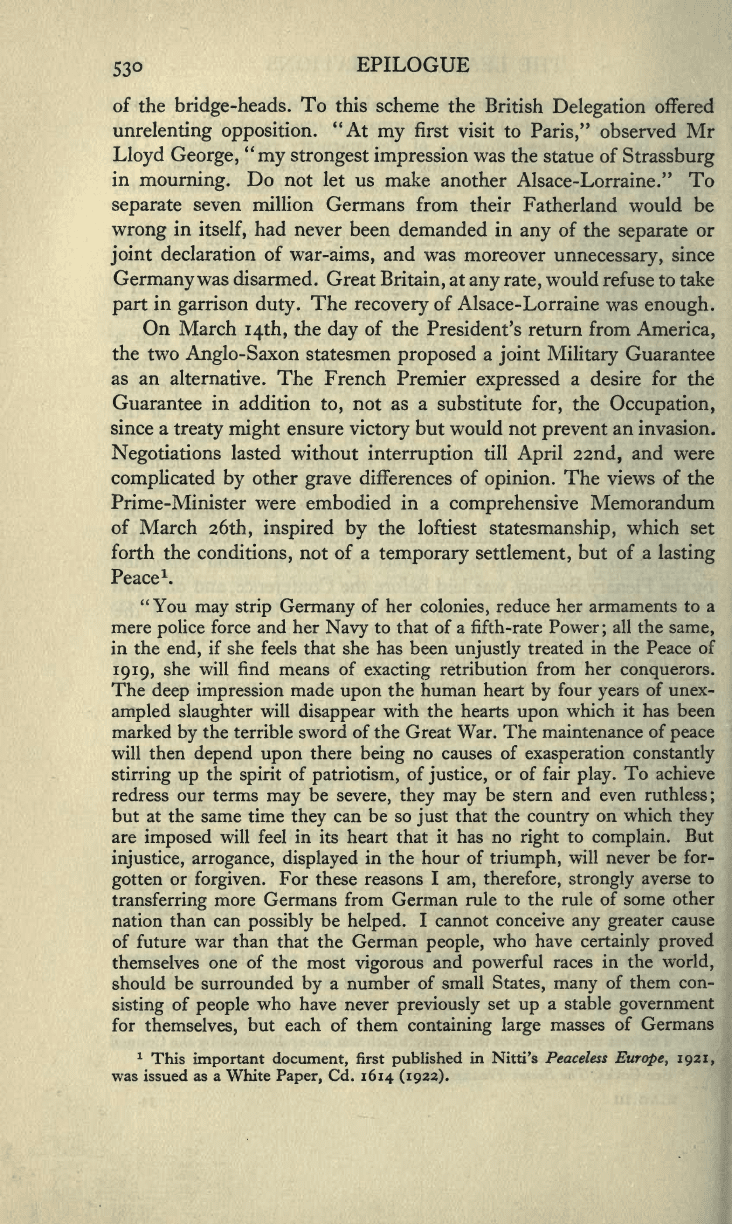
53o
EPILOGUE
of
the
bridge-heads.
To
this
scheme the
British
Delegation
offered
unrelenting
opposition.
"At
my
first
visit to
Paris,"
observed Mr
Lloyd
George,
"my strongest impression
was
the
statue
of
Strassburg
in
mourning.
Do
not let
us
make
another
Alsace-Lorraine."
To
separate
seven
million Germans from
their
Fatherland would
be
wrong
in
itself,
had
never
been
demanded
in
any
of
the
separate
or
joint
declaration of
war-aims,
and
was
moreover
unnecessary,
since
Germany
was
disarmed.
Great
Britain,
at
any
rate,
would
refuse to take
part
in
garrison
duty.
The
recovery
of
Alsace-Lorraine
was
enough.
On March
14th,
the
day
of
the President's return
from
America,
the
two
Anglo-Saxon
statesmen
proposed
a
joint Military
Guarantee
as an
alternative. The French Premier
expressed
a
desire
for
the
Guarantee
in
addition
to,
not
as
a substitute
for,
the
Occupation,
since
a
treaty might
ensure
victory
but
would
not
prevent
an invasion.
Negotiations
lasted
without
interruption
till
April
22nd,
and
were
complicated
by
other
grave
differences
of
opinion.
The views
of
the
Prime-Minister were embodied
in
a
comprehensive
Memorandum
of March
26th,
inspired
by
the loftiest
statesmanship,
which set
forth the
conditions,
not
of a
temporary
settlement,
but
of
a
lasting
Peace
1
.
"You
may strip Germany
of
her
colonies,
reduce
her armaments
to a
mere
police
force and
her
Navy
to that of
a
fifth-rate
Power;
all the
same,
in
the
end,
if she
feels
that
she has been
unjustly
treated in the
Peace
of
19
19,
she
will find
means
of
exacting
retribution
from her
conquerors.
The
deep impression
made
upon
the
human
heart
by
four
years
of unex-
ampled slaughter
will
disappear
with
the
hearts
upon
which it
has
been
marked
by
the
terrible sword
of
the
Great War.
The
maintenance
of
peace
will then
depend upon
there
being
no causes of
exasperation
constantly
stirring up
the
spirit
of
patriotism,
of
justice,
or of fair
play.
To achieve
redress our terms
may
be
severe,
they may
be stern
and even
ruthless;
but at
the same time
they
can
be so
just
that the
country
on
which
they
are
imposed
will
feel
in its
heart
that it has no
right
to
complain.
But
injustice,
arrogance,
displayed
in the
hour of
triumph,
will never be
for-
gotten
or
forgiven.
For these reasons
I
am,
therefore,
strongly
averse
to
transferring
more Germans from
German
rule
to the rule
of some
other
nation than can
possibly
be
helped.
I cannot
conceive
any greater
cause
of future
war than
that the German
people,
who have
certainly proved
themselves
one of the
most
vigorous
and
powerful
races in
the
world,
should
be surrounded
by
a number
of small
States,
many
of them
con-
sisting
of
people
who
have never
previously
set
up
a stable
government
for
themselves,
but each of them
containing large
masses
of Germans
1
This
important
document,
first
published
in Nitti's
Peaceless
Europe,
1921,
was
issued
as a White
Paper,
Cd.
16
14
(1922).
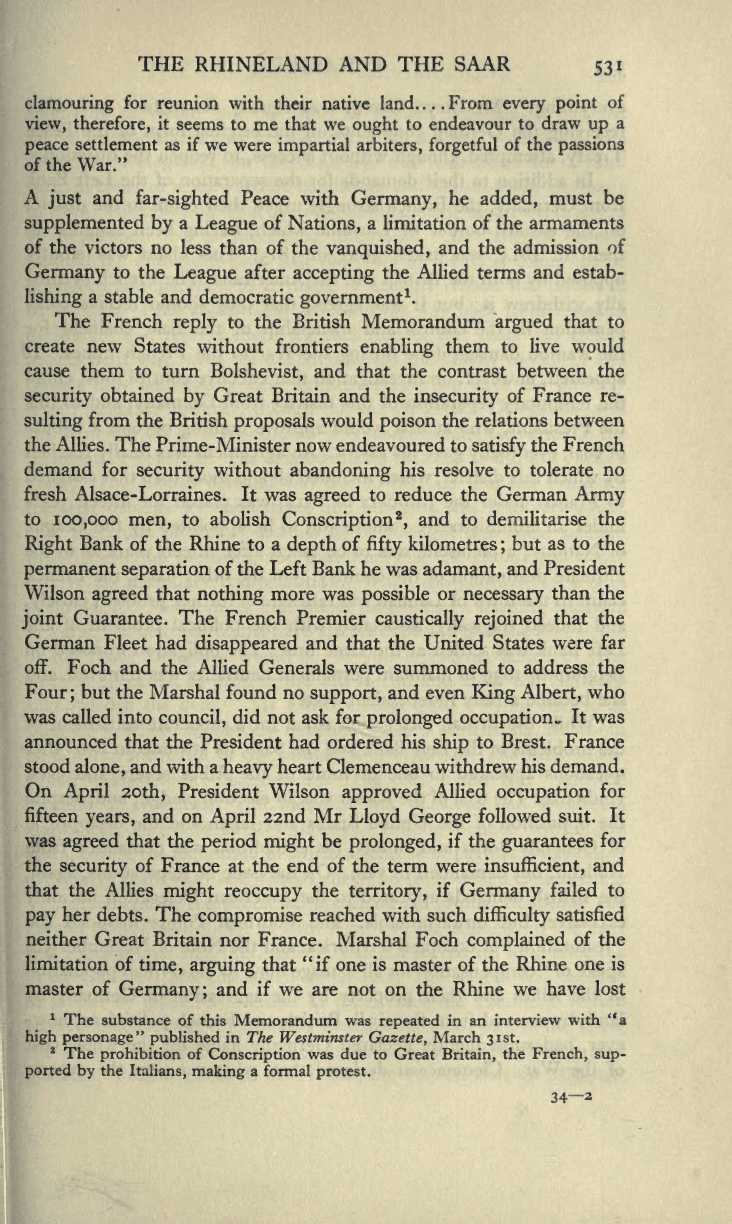
THE
RHINELAND
AND THE SAAR
531
clamouring
for
reunion with
their native
land From
every point
of
view, therefore,
it
seems
to me that we
ought
to endeavour
to
draw
up
a
peace
settlement as if
we were
impartial
arbiters,
forgetful
of the
passions
of
the War."
A
just
and
far-sighted
Peace with
Germany,
he
added,
must
be
supplemented
by
a
League
of
Nations,
a
limitation
of the
armaments
of
the
victors
no
less
than
of
the
vanquished,
and
the
admission
of
Germany
to
the
League
after
accepting
the Allied terms
and estab-
lishing
a
stable and
democratic
government
1
.
The
French
reply
to the British
Memorandum
argued
that
to
create new
States
without frontiers
enabling
them
to live
would
cause
them
to turn
Bolshevist,
and
that
the contrast
between
the
security
obtained
by
Great Britain
and
the
insecurity
of France re-
sulting
from
the
British
proposals
would
poison
the
relations between
the
Allies.
The
Prime-Minister
now endeavoured
to
satisfy
the
French
demand for
security
without
abandoning
his
resolve
to
tolerate
no
fresh
Alsace-Lorraines.
It
was
agreed
to
reduce
the
German
Army
to
100,000
men,
to
abolish
Conscription
2
,
and
to
demilitarise
the
Right
Bank
of
the Rhine
to
a
depth
of
fifty
kilometres
;
but
as
to
the
permanent
separation
of
the
Left
Bank he was
adamant,
and
President
Wilson
agreed
that
nothing
more was
possible
or
necessary
than the
joint
Guarantee. The French
Premier
caustically
rejoined
that
the
German
Fleet
had
disappeared
and that the United States
were
far
off.
Foch and
the Allied Generals were summoned to
address the
Four;
but the Marshal
found
no
support,
and even
King
Albert,
who
was
called into
council,
did
not
ask for
prolonged
occupation..
It was
announced
that
the
President
had
ordered
his
ship
to
Brest.
France
stood
alone,
and
with
a
heavy
heart Clemenceau
withdrew
his demand.
On
April
20th,
President Wilson
approved
Allied
occupation
for
fifteen
years,
and on
April
22nd
Mr
Lloyd George
followed
suit. It
was
agreed
that the
period
might
be
prolonged,
if the
guarantees
for
the
security
of
France at the end
of
the term
were
insufficient,
and
that the Allies
might
reoccupy
the
territory,
if
Germany
failed to
pay
her
debts. The
compromise
reached
with
such
difficulty
satisfied
neither
Great Britain
nor
France. Marshal
Foch
complained
of
the
limitation of
time,
arguing
that
"if one
is
master
of
the
Rhine
one
is
master
of
Germany;
and
if we are
not
on
the
Rhine
we
have lost
1
The
substance
of
this Memorandum was
repeated
in
an interview
with
"a
high
personage"
published
in The Westminster
Gazette,
March
31st.
2
The
prohibition
of
Conscription
was due to
Great
Britain,
the
French,
sup-
ported
by
the
Italians,
making
a formal
protest.
34—2
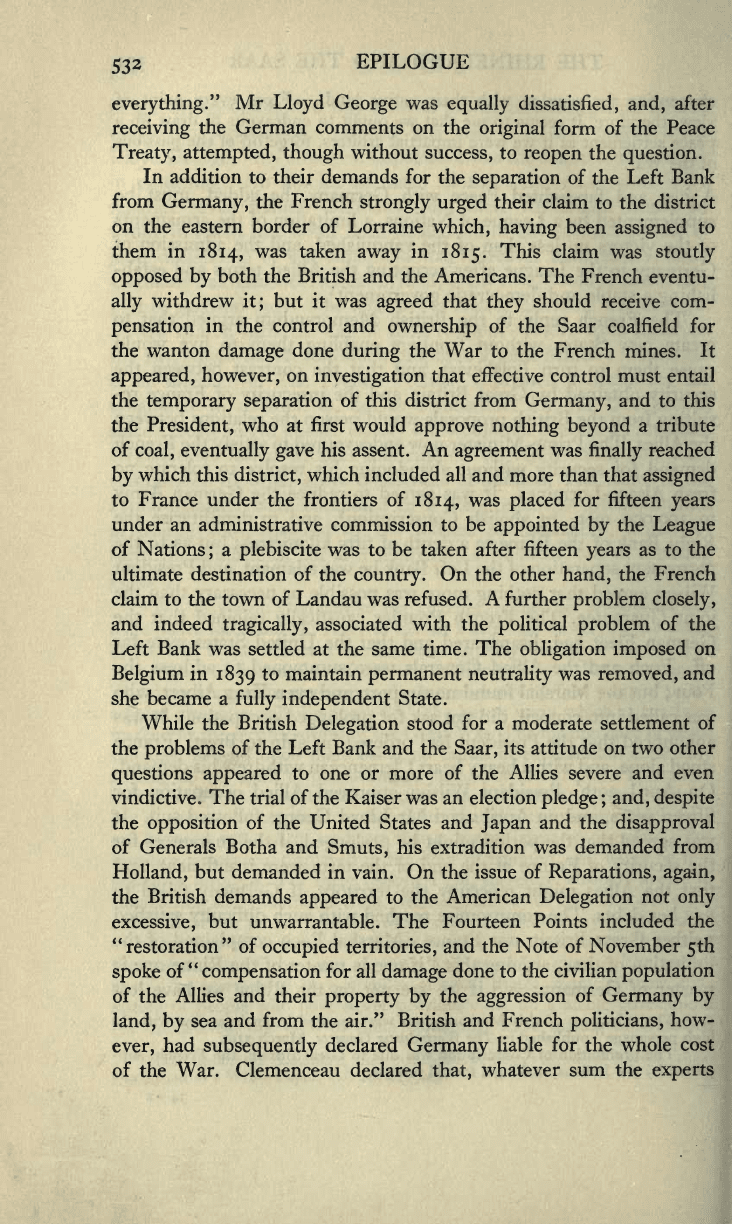
532
EPILOGUE
everything."
Mr
Lloyd
George
was
equally
dissatisfied, and,
after
receiving
the
German
comments
on
the
original
form of
the
Peace
Treaty,
attempted,
though
without
success,
to
reopen
the
question.
In
addition to their demands for
the
separation
of
the
Left
Bank
from
Germany,
the
French
strongly urged
their claim
to
the
district
on the
eastern border
of
Lorraine
which,
having
been
assigned
to
them
in
1814,
was
taken
away
in
1815.
This claim
was
stoutly
opposed by
both the British and
the Americans. The
French eventu-
ally
withdrew
it;
but it
was
agreed
that
they
should
receive
com-
pensation
in
the
control and
ownership
of
the
Saar
coalfield
for
the wanton
damage
done
during
the War to the French mines. It
appeared,
however,
on
investigation
that effective
control
must entail
the
temporary
separation
of
this
district
from
Germany,
and to this
the
President,
who
at first
would
approve
nothing beyond
a tribute
of
coal,
eventually gave
his assent.
An
agreement
was
finally
reached
by
which
this
district,
which included all and more
than that
assigned
to France under the
frontiers
of 18
14,
was
placed
for
fifteen
years
under an
administrative
commission
to be
appointed by
the
League
of
Nations
;
a
plebiscite
was to be taken after fifteen
years
as to
the
ultimate
destination
of
the
country.
On
the
other
hand,
the
French
claim to
the town
of
Landau was
refused.
A
further
problem closely,
and indeed
tragically,
associated with the
political problem
of
the
Left Bank was
settled at the
same
time.
The
obligation
imposed
on
Belgium
in
1839
to maintain
permanent
neutrality
was
removed,
and
she became
a
fully
independent
State.
While
the British
Delegation
stood
for
a moderate settlement
of
the
problems
of
the Left Bank
and
the
Saar,
its attitude
on
two
other
questions
appeared
to one or more
of
the
Allies severe and even
vindictive. The trial of the Kaiser was an election
pledge
;
and,
despite
the
opposition
of
the
United
States
and
Japan
and
the
disapproval
of Generals
Botha
and
Smuts,
his extradition
was demanded
from
Holland,
but
demanded
in
vain. On
the issue
of
Reparations, again,
the
British demands
appeared
to the
American
Delegation
not
only
excessive,
but
unwarrantable. The
Fourteen Points
included
the
"restoration"
of
occupied
territories,
and the Note
of November
5th
spoke
of
"
compensation
for all
damage
done to
the
civilian
population
of
the
Allies
and
their
property
by
the
aggression
of
Germany
by
land,
by
sea
and from
the
air." British
and
French
politicians,
how-
ever,
had
subsequently
declared
Germany
liable
for
the
whole
cost
of
the
War.
Clemenceau
declared
that,
whatever
sum
the
experts
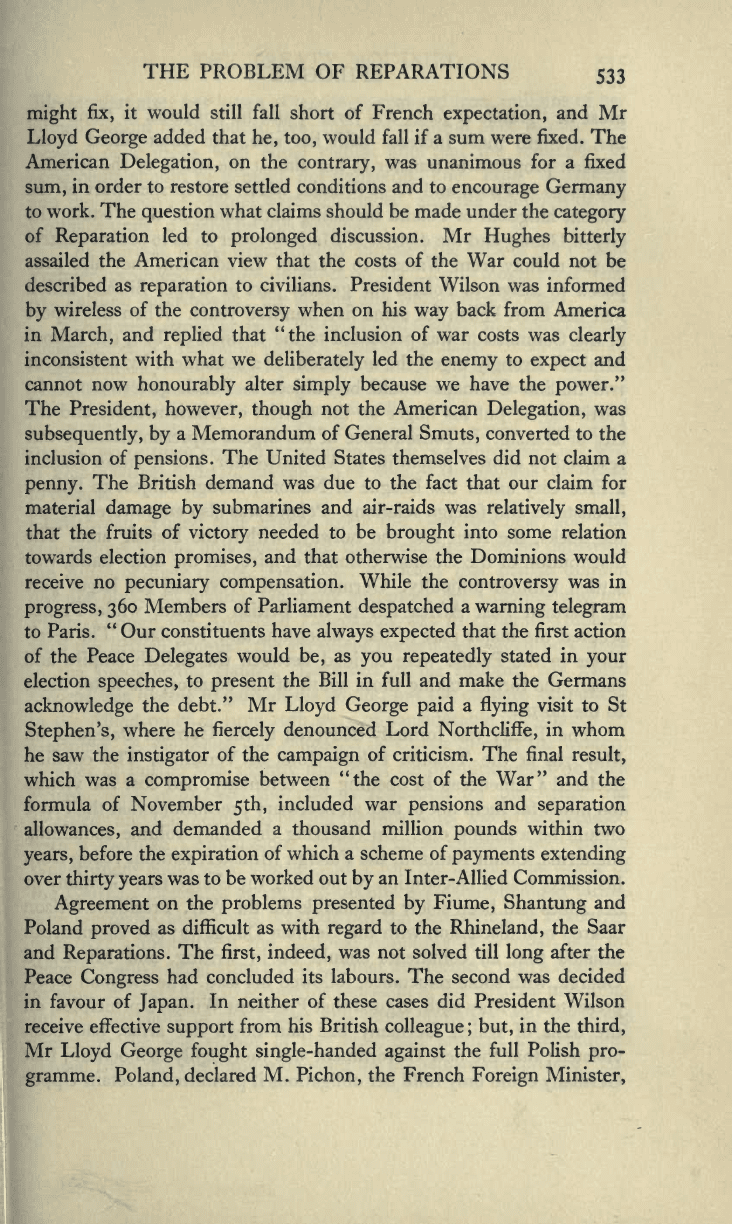
THE PROBLEM
OF REPARATIONS
533
might
fix,
it
would
still fall
short
of
French
expectation,
and
Mr
Lloyd
George
added
that
he, too,
would fall if a
sum were fixed. The
American
Delegation,
on
the
contrary,
was unanimous for a fixed
sum,
in
order
to restore
settled conditions
and
to
encourage
Germany
to
work. The
question
what claims
should
be made
under the
category
of
Reparation
led
to
prolonged
discussion.
Mr
Hughes bitterly
assailed the American view
that the costs
of
the
War
could
not be
described
as
reparation
to
civilians.
President Wilson was
informed
by
wireless
of
the
controversy
when
on his
way
back
from
America
in
March,
and
replied
that "the
inclusion
of
war
costs
was
clearly
inconsistent with what
we
deliberately
led the
enemy
to
expect
and
cannot now
honourably
alter
simply
because we have
the
power."
The
President,
however,
though
not the American
Delegation,
was
subsequently, by
a Memorandum of
General
Smuts,
converted to
the
inclusion of
pensions.
The United States themselves
did
not
claim
a
penny.
The British
demand
was
due to the
fact that
our claim
for
material
damage by
submarines
and air-raids was
relatively
small,
that the fruits
of
victory
needed
to be
brought
into some relation
towards election
promises,
and
that otherwise
the Dominions
would
receive
no
pecuniary
compensation.
While the
controversy
was in
progress, 360
Members
of
Parliament
despatched
a
warning telegram
to
Paris.
"
Our constituents
have
always
expected
that
the
first action
of
the
Peace
Delegates
would
be,
as
you
repeatedly
stated
in
your
election
speeches,
to
present
the
Bill in full and
make the Germans
acknowledge
the
debt." Mr
Lloyd George
paid
a
flying
visit to St
Stephen's,
where
he
fiercely
denounced
Lord
NorthclifFe,
in whom
he
saw the
instigator
of
the
campaign
of
criticism.
The final
result,
which
was a
compromise
between "the cost
of
the
War" and
the
formula
of
November
5th,
included war
pensions
and
separation
allowances,
and demanded
a
thousand million
pounds
within
two
years,
before the
expiration
of which a
scheme of
payments
extending
over
thirty
years
was to
be worked out
by
an
Inter-Allied
Commission.
Agreement
on
the
problems
presented
by
Fiume,
Shantung
and
Poland
proved
as difficult
as
with
regard
to
the
Rhineland,
the
Saar
and
Reparations.
The
first,
indeed,
was
not solved till
long
after the
Peace
Congress
had concluded its
labours.
The second
was decided
in favour of
Japan.
In
neither
of these cases did President
Wilson
receive effective
support
from
his British
colleague
;
but,
in
the
third,
Mr
Lloyd George fought
single-handed against
the
full Polish
pro-
gramme.
Poland,
declared
M.
Pichon,
the French
Foreign
Minister,
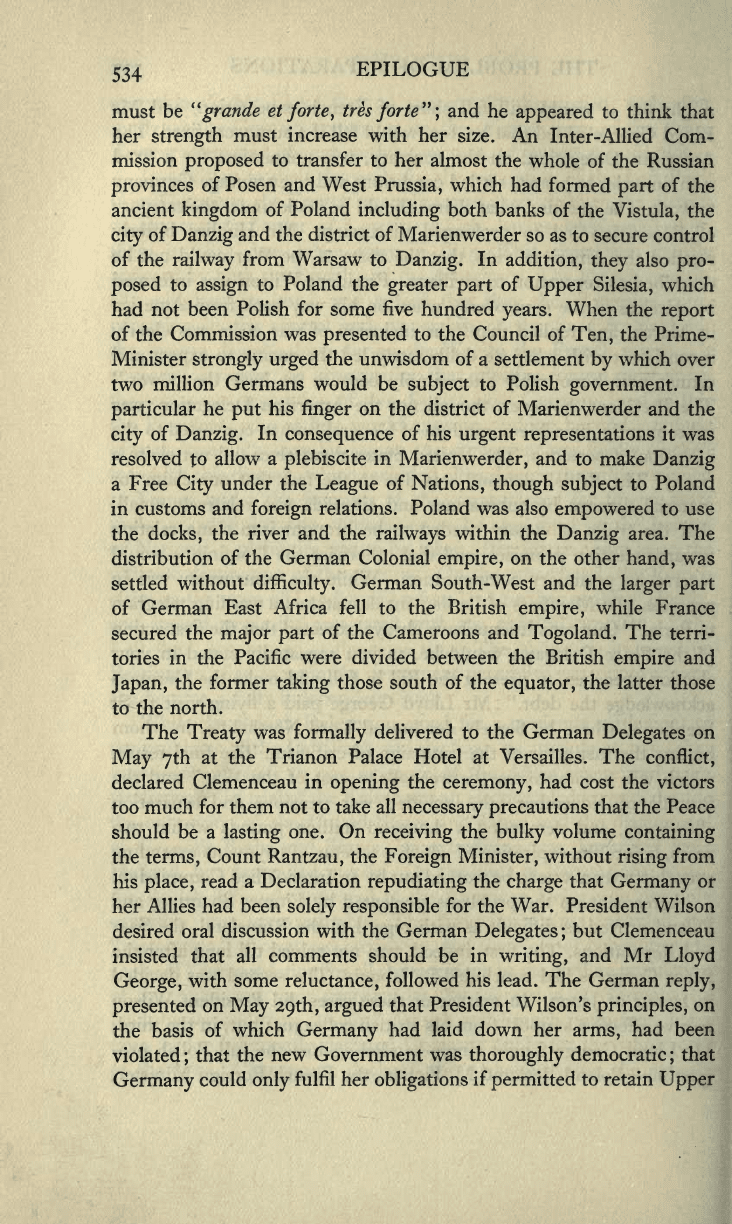
534
EPILOGUE
must
be
"
grande
et
forte,
tres
forte";
and
he
appeared
to think
that
her
strength
must increase with her
size.
An
Inter-
Allied
Com-
mission
proposed
to transfer to her
almost the
whole
of
the Russian
provinces
of Posen and
West
Prussia,
which
had
formed
part
of
the
ancient
kingdom
of Poland
including
both banks of
the
Vistula,
the
city
of
Danzig
and the
district
of
Marienwerder so
as
to secure control
of
the
railway
from Warsaw
to
Danzig.
In
addition,
they
also
pro-
posed
to
assign
to
Poland
the
greater part
of
Upper
Silesia,
which
had not
been Polish
for
some
five
hundred
years.
When
the
report
of
the
Commission
was
presented
to
the
Council of
Ten,
the
Prime-
Minister
strongly urged
the unwisdom of
a settlement
by
which
over
two
million Germans
would
be
subject
to
Polish
government.
In
particular
he
put
his
finger
on
the
district
of
Marienwerder and the
city
of
Danzig.
In
consequence
of his
urgent representations
it was
resolved to
allow a
plebiscite
in
Marienwerder,
and
to
make
Danzig
a Free
City
under the
League
of
Nations,
though
subject
to
Poland
in
customs
and
foreign
relations.
Poland was
also
empowered
to
use
the
docks,
the
river
and
the
railways
within
the
Danzig
area.
The
distribution
of
the
German
Colonial
empire,
on
the other
hand,
was
settled
without
difficulty.
German
South-West
and
the
larger
part
of German
East
Africa
fell to the British
empire,
while
France
secured the
major
part
of
the Cameroons and
Togoland.
The
terri-
tories
in
the
Pacific were divided between the British
empire
and
Japan,
the
former
taking
those south
of
the
equator,
the
latter those
to the
north.
The
Treaty
was
formally
delivered to
the
German
Delegates
on
May
7th
at the
Trianon Palace
Hotel at Versailles. The
conflict,
declared
Clemenceau
in
opening
the
ceremony,
had
cost the victors
too
much
for them not to take
all
necessary
precautions
that
the
Peace
should be
a
lasting
one. On
receiving
the
bulky
volume
containing
the
terms,
Count
Rantzau,
the
Foreign
Minister,
without
rising
from
his
place,
read a Declaration
repudiating
the
charge
that
Germany
or
her
Allies had been
solely
responsible
for
the
War.
President
Wilson
desired
oral
discussion
with the
German
Delegates;
but
Clemenceau
insisted
that
all comments
should be
in
writing,
and Mr
Lloyd
George,
with
some
reluctance,
followed
his
lead. The German
reply,
presented
on
May 29th, argued
that
President Wilson's
principles,
on
the
basis
of
which
Germany
had
laid down
her
arms,
had been
violated
;
that the
new
Government
was
thoroughly
democratic
;
that
Germany
could
only
fulfil her
obligations
if
permitted
to
retain
Upper
